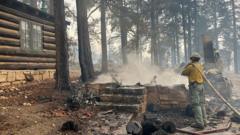**As the wildfire season kicks off with a deadly incident, experts confirm that warm and windy conditions could lead to an escalation of fires across Canada.**
**Canada Faces Tragedy as Wildfire Season Claims Two Lives**

**Canada Faces Tragedy as Wildfire Season Claims Two Lives**
**Devastating wildfires in Manitoba result in the tragic deaths of two residents amid record heat.**
In a heartbreaking start to Canada’s wildfire season, two individuals lost their lives in Manitoba as a fierce wildfire swept through their community. The incident occurred in Lac du Bonnet, a town located northeast of Winnipeg, which was under a mandatory evacuation order at the time. Rescue personnel were unable to reach the victims amid the chaos of the rapidly expanding flames, which have since consumed approximately 10,000 acres of land.
Manitoba Premier Wab Kinew expressed his condolences during a press conference, highlighting the shift from emergency to tragedy in the wake of this loss. The names of the deceased, a man and woman, have not been disclosed, and specific details regarding the location of their discovery remain unclear.
Residents in Lac du Bonnet are grappling with the shocking nature of the fires, which have grown in intensity and speed. “People here are somewhat in shock over the ferocity of the fires and how quickly it all occurred,” said Ken Lodge, the town's mayor. Approximately 1,000 individuals from Lac du Bonnet and nearby areas were evacuated as crews worked to manage the blaze.
The wildfire comes as parts of Manitoba endure an extreme heat wave, with temperatures in Winnipeg reaching record levels of 37 degrees Celsius (around 99 degrees Fahrenheit). Although wildfires are also active in several jurisdictions across the country, most remain under control for now.
Fire investigators are awaiting initial reports on the potential causes, including the likelihood of lightning strikes leading to increased fire activity this spring, exacerbated by warm and windy conditions. The summer months from May to September are typically marked by heightened wildfire activity, although 2023 has proved particularly devastating, with over 6,000 fires recorded across Canada, causing significant displacement and destruction.
Last year, wildfires in Quebec produced toxic smoke that affected air quality as far south as the United States, resulting in hospital visits for respiratory issues among residents. These wildfires have been identified as significant contributors to global carbon emissions.
Currently, roughly 100 wildfires are burning across Canada, with five active fires in Manitoba currently out of control. Despite rain offering some temporary relief, it is acknowledged that the upcoming holiday weekend – coinciding with Queen Victoria’s birthday and traditional fireworks displays – presents a unique challenge.
As Premier Kinew remarked, “We’re asking for rain,” demonstrating the urgent need for assistance in combating the ongoing fire threat.
Manitoba Premier Wab Kinew expressed his condolences during a press conference, highlighting the shift from emergency to tragedy in the wake of this loss. The names of the deceased, a man and woman, have not been disclosed, and specific details regarding the location of their discovery remain unclear.
Residents in Lac du Bonnet are grappling with the shocking nature of the fires, which have grown in intensity and speed. “People here are somewhat in shock over the ferocity of the fires and how quickly it all occurred,” said Ken Lodge, the town's mayor. Approximately 1,000 individuals from Lac du Bonnet and nearby areas were evacuated as crews worked to manage the blaze.
The wildfire comes as parts of Manitoba endure an extreme heat wave, with temperatures in Winnipeg reaching record levels of 37 degrees Celsius (around 99 degrees Fahrenheit). Although wildfires are also active in several jurisdictions across the country, most remain under control for now.
Fire investigators are awaiting initial reports on the potential causes, including the likelihood of lightning strikes leading to increased fire activity this spring, exacerbated by warm and windy conditions. The summer months from May to September are typically marked by heightened wildfire activity, although 2023 has proved particularly devastating, with over 6,000 fires recorded across Canada, causing significant displacement and destruction.
Last year, wildfires in Quebec produced toxic smoke that affected air quality as far south as the United States, resulting in hospital visits for respiratory issues among residents. These wildfires have been identified as significant contributors to global carbon emissions.
Currently, roughly 100 wildfires are burning across Canada, with five active fires in Manitoba currently out of control. Despite rain offering some temporary relief, it is acknowledged that the upcoming holiday weekend – coinciding with Queen Victoria’s birthday and traditional fireworks displays – presents a unique challenge.
As Premier Kinew remarked, “We’re asking for rain,” demonstrating the urgent need for assistance in combating the ongoing fire threat.




















